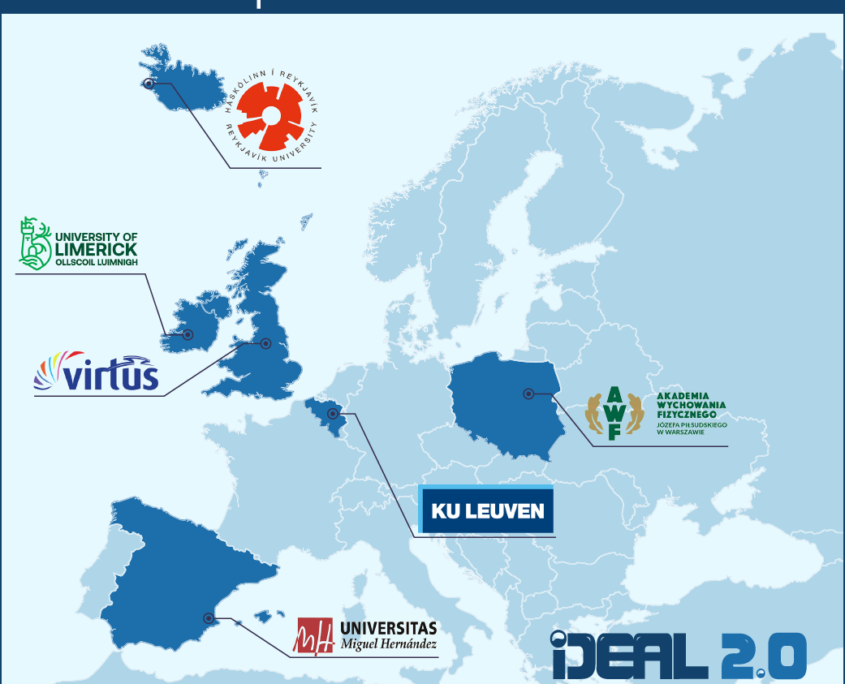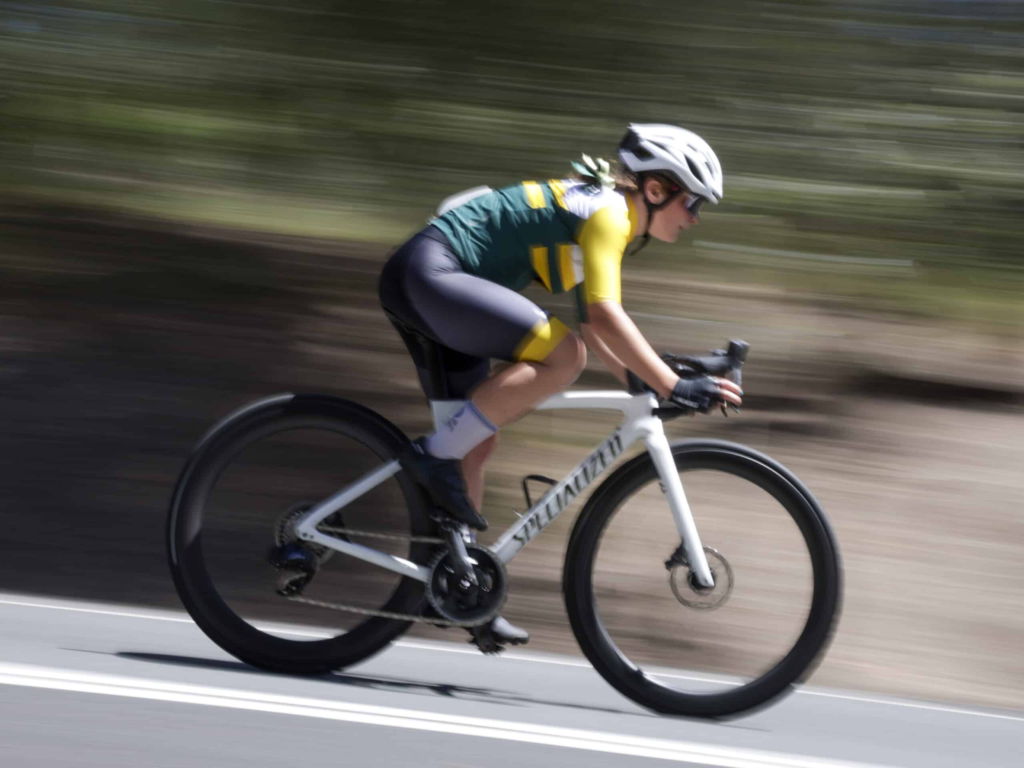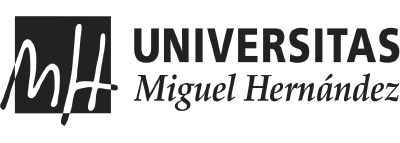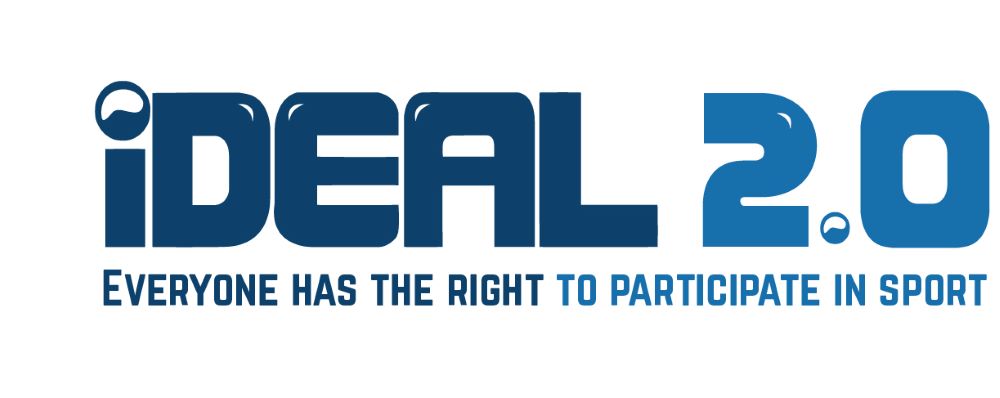IDEAL 2.0 stands for “Inclusive and Equitable sport for people with Autism and Intellectual Disability”.
IDEAL 2.0 is a project funded by the European commission with Virtus Academy as one of the main partners.
What is the goal of the project?
The overall goal of the IDEAL 2.0 project is to facilitate equitable and inclusive access to sport and physical activity for young people with Intellectual Disability (ID) and/or Autism Spectrum Disorder (ASD).
What does “2.0” stand for?
Following from the outcomes of the successful first IDEAL project, finalized in 2020, which identified the needs of this population, and in response to the impact of COVID-19, a new consortium was established to address these needs to promote inclusive and equitable sport for people with autism and/or intellectual disabilities.
What does “IDEAL” stand for?
Aligning with the acronym, the key aims representing the project are:
I – Include (create awareness within society about Inclusivity in sport)
D – Develop (translate Evidence-based practices and interventions successfully to PA/sport professionals)
E – Educate (teach coaches and support staff on how to organize adapted PA or sport training)
A – Activate (address the relevant social-determinants of inactivity among individuals with ID and ASD).
L – Lead (foster their leadership and employability skills through sport and PA)
 The University of Limerick, Ireland hosted the second annual meeting of the IDEAL 2.0 project on 5th and 6th July.
The University of Limerick, Ireland hosted the second annual meeting of the IDEAL 2.0 project on 5th and 6th July.
“We are now trying to underpin the literature on how Physical Activity can improve these domains for people with intellectual disabilities, and promote the importance of Physical Activity for them to have a greater chance at employment,” she further added.
Why is IDEAL relevant?
In an IDEAL world, everyone has the right to participate on an equal basis with others in society. However, the reality in many EU countries is that the majority of young people with disabilities still find it difficult to be physically active or access sport. They have fewer opportunities for full and equal participation in the activity of their choice. Being active is a public health priority focus by the EU, but having a developmental disorder is related to lower general activity rates, and is a vulnerability factor for poor health. The worldwide COVID-19 pandemic has caused additional challenges for all, and it has further restricted the physical activity routines of these marginalized people even more, leading to direct and indirect negative physical and mental health consequences.

The overall project goal is to facilitate equitable and inclusive access to sport and physical activity for young people with intellectual disability and/or autism.
KU Leuven is the project coordinator who oversees the work packages, which are translated into 5 key actions, aligning with the IDEAL acronym:
1. INCLUSION: to create awareness within society about inclusivity in sport.
Lead partner: Virtus
In this part of the project we are working on media campaigns and other virtual/digital events to inspire and raise awareness within society about inclusivity in sport.

2. DEVELOP: to translate Evidence-based practices successfully to sport professionals.
Lead partner: Jozef Piludski University Warsaw
In this part of the project we are working on a toolkit to assist sport organisations and athletes to cope with direct and indirect consequences of unpredicted events causing reduced access to sport and physical activity in society (e.g., pandemic/isolation, war, lower economic status)

3. EDUCATE: Teach coaches and support staff on how to organize adapted sport training.
Lead partner 1: KU Leuven, Lead partner 2: University of Reykjavik
In this part of the project we are engaging sport professionals to learn more about working in a more inclusive way. Webinars and online courses will be developed after investigating the needs and lack of knowledge reported by the stakeholders themselves.

4. ACTIVATE: Address the relevant social determinants of inactivity through digital interventions.
Lead partner: Limerick University (Dr. Sean Healy)
The scientific literature on the potential of digital interventions to increase physical activity among people with ID and/or autism will be reviewed and best practices disseminated. Moreover, a new digital health intervention will be developed and implemented for the purpose of increasing self-regulation and motivation for sport for inactive youth with intellectual disability and/or autism.

4. LEADERSHIP: Foster leadership and employability skills through sport and physical activity.
Lead partner: Miguel Hernandez University of Elche (prof. Alba Roldan Romero)

People with ID and/or autism face more barriers towards labour inclusion than people without disabilities. Limitations associated to social and cognitive skills makes it harder to obtain and maintain a job for these young athletes. Therefore, the main goal of this work-package is to enhance leadership skills (i.e. interpersonal skills), as they are essential for a productive workplace. Physical activity training sessions become an important context to empower these interpersonal skills, in order to transfer them to their work space.
A complete summary of all resources produced by the IDEAL project.
- Summary report – Summary of the project in infographic style containing links to the different output (pdf, ENG)
- E-Manual of Best Practice – Soft skill manual for coaches working with athletes with intellectual disability to enhance leadership and soft skills through sport and physical activity (pdf, ENG, FRA, GER, Dutch, POL)
- Deliverable online workshop softskills – Workshop for coaches and support staff ‘enhancing leadership and personal development skills of athletes’
- A systematic review of digital interventions to promote physical activity in people with intellectual disability – a web-based intervention including 3 scientific papers:
- an overall review of web based interventions,
- a description of the AI-chatbot intervention for autistic students
- general guidelines for AI-interventions for people with autism
- Coaching individuals with intellectual disabilities and/or autism (introductory) – online course providing training for para-coaches (free registration needed)
- Coaching elite athletes with intellectual disability and/or autism (advanced) – online course providing training for para-coaches (free registration needed)
- Autism Awareness – online course to raise awareness about autism in sport (free registration needed)
- Let’s get moving toolkit – online training for support staff working with people with intellectual disability (free registration needed)
- Guidelines and Recommendations – specific guidelines on how to facilitate equitable and inclusive access to sport for people with intellectual disability and/or autism (pdf, ENG, Dutch, POL, Spanish and FRA)
- Good Practice Guide Sports Coaching – Best practice manual with evidence-based guidelines on coaching athletes with intellectual disabilities (pdf, ENG, Dutch, POL, SWE, ESP)
- Coaching manual – Nordic Ski– Coaching manual with specific guidelines for coaching athletes in winter sports (pdf)
- Coaching manual – Athletics – Coaching manual with specific guidelines for coaching athletes in athletics (ppt)
- Coaching manual – Basketball – Coaching manual with specific guidelines for coaching athletes in team sports such as basketball (pdf) – PART A
- Coaching manual part B – Basketball – Coaching manual with specific guidelines for coaching athletes in team sports such as basketball (ppt)
- RAID Database – our resources library
- Comparative Study – Scientific paper on the organization of sport for athletes with intellectual disability based on a study in 10 EU countries.
- Videos – Two short videos starring ID athletes discussing why sport is important and how sport can change your life

Virtus is the brand name of the International Sports Federation for athletes with intellectual impairment and is a founding member of the International Paralympic Committee. Registered as a Charitable Incorporated Organisation in the UK (1173901).

